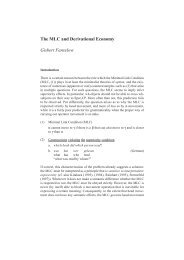'Split wh-constructions in Classical and Modern Greek'
'Split wh-constructions in Classical and Modern Greek'
'Split wh-constructions in Classical and Modern Greek'
Create successful ePaper yourself
Turn your PDF publications into a flip-book with our unique Google optimized e-Paper software.
(12) a. Which power i does it have t i?<br />
b. Whose book i did you br<strong>in</strong>g t i?<br />
(13) The RED DRESS i I saw t i.<br />
Follow<strong>in</strong>g ideas by Dev<strong>in</strong>e & Stephens (2000), we assume that<br />
splitt<strong>in</strong>g can be traced back to two NPs <strong>in</strong> apposition. NP 1 conta<strong>in</strong>s<br />
a nom<strong>in</strong>al. NP 2 consists of [Mod e], <strong>wh</strong>ereby Mod = modifier <strong>and</strong><br />
e an empty category - the semantic equivalent of pro –<strong>wh</strong>ich<br />
st<strong>and</strong>s for a nom<strong>in</strong>al). The modifier is thus a so-called null head<br />
modifier. By ‘modifier’, we mean a superclass <strong>wh</strong>ich <strong>in</strong>cludes<br />
both adjectives <strong>and</strong> <strong>wh</strong>-words. By ‘null head modifier’ we mean,<br />
follow<strong>in</strong>g Dev<strong>in</strong>e & Stephens’s def<strong>in</strong>ition a modifier that can<br />
st<strong>and</strong> by itself <strong>in</strong> place of a noun phrase without the support of a<br />
noun or an overt pronoun. The modifier restricts e. The nom<strong>in</strong>al<br />
(unselectively) b<strong>in</strong>ds the empty category. This means that the<br />
configuration yielded by split <strong>constructions</strong> is like (14b) rather<br />
than (14a):<br />
(14) a. *X i [ ZP t i Y]<br />
b. [XP] i [ ZP Y ] t i<br />
The po<strong>in</strong>t is that <strong>wh</strong>at moves is not a head, but a DP. This is most<br />
obvious <strong>in</strong> the case of bare adjectival extraction ((9) <strong>wh</strong>ich is repeated<br />
here for convenience):<br />
(9) b. [To KOKKINO] F idha forema. (CG)<br />
the red see PAST 1SG dress<br />
‘It is the RED dress that I saw.’<br />
(Androutsopoulou 1997:2)<br />
148

















